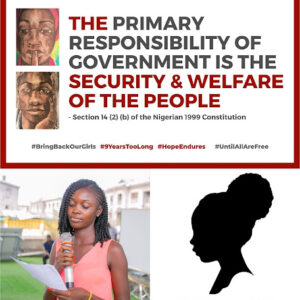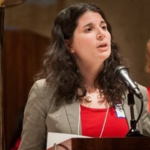By: Tehilah E. Eisenstadt

Since late 2014, nine years ago, I’ve worn a necklace that simply has “182” on it. Lots of people ask about it. My response to their question about the necklace is usually something like this: “It’s a sad story, do you want to hear it?” In nine years, no one has replied “no” to this question.
Then, I proceed: “In 2014 there were 276 children kidnapped from their school.” If a child is asking, I hastily add “in Nigeria” so that they feel safe. If it is an adult, I give an extra moment for them to be confused, because we are all country-centric, and I want them to feel like these missing children were a part of their world no matter where their lives happened and were stolen away.
Some folks even know what I am talking about, and say: “Oh, yes, in Chibok.” I proceed to say that some of these girls escaped, some were freed and some remain in captivity. These days I cite the number at “94 girls, now women, are still with their kidnappers.” I say it this way because some of the girls who have been freed have stated quite clearly that not all the still-missing girls are alive but they are also decidedly not with their families or known to their families to be dead for proper burial and mourning.
I conclude: “There is a Jewish blessing for freeing the enslaved person; I say this prayer every morning as I put this necklace on. My son is often there to say ‘amen.’ This prayer has worked for more than half of the girls but not this one, Lydia Simon. We did not share names but assigned numbers in 2014 in the hopes they’d immediately be free and we didn’t want this horror to follow them.” I usually shrug a bit at thinking the girls, now women, would all be free that quickly. People often thank me for keeping the girls in mind, and for reminding them.
Last week I was working with 7th graders as they were joyfully preparing Israeli salad as part of the celebration of Israel’s 75th birthday. The modern State of Israel is 11 years older than Nigeria; which is to say they are both such young democracies with so much to figure out. A student looks at me after my usual speech and said, “The girls who are still kidnapped, are they being raped?” I paused, and then found the words: “Many of the girls who escape their captors show up with young children.”
I felt terrible confirming this news. I neither wanted to lie to a child who gets that for millenia men have fought wars on women’s bodies, or she just gets that to grab a female child in a war is different than to grab a male one. I also didn’t want to confirm her horrible guess.
Nine years ago I thought of all of our children here in the US as so much safer, so much more fortunate than those in the villages unchecked by the Boko Haram insurgency and other terror attacks. It is still true that by and large our children are safer, but in the nine years since the Chibok kidnapping, our children too are less safe at school. The story changes in the telling; our children here in the US know about going to school with a measure of fear and uncertainty.
The reason I became involved from the start has not changed. If anything, the reasons have grown. Yet, as one of the founders of Bring Back Our Girls NY and now part of the globally organized Bring Back Our Girls movement, I still feel odd, as a white-presenting Jewish woman in Brooklyn, who has never been to Nigeria. My involvement began in 2014, as the news broke in the US when Jewish people were counting each day of the Omer (a time between Passover and the festival of Shavuot). When I read the news around midnight, I then emailed my interfaith colleagues. I told them I would count until the girls came home, I told them I had no idea what to do about this news but I knew how to call people together in prayer, and so we did. I also knew I had a 3 year old at home and I could not imagine looking him in the eye and doing nothing. My son is the great-grandson of Holocaust survivors; his father is named after his uncle, a child who was murdered by Nazis in front of his father, while the world largely did nothing. I have never fathomed how the world, those that knew, did nothing. It is what gave me the chutzpah to do something when I didn’t believe I had much power to affect girls, grabbed by terrorists, half a world away.
Having worked with children through the pandemic and thereafter, I see the effects of being cut off from the world in many ways. Even though all the children I worked with still had at least one parent with them, food, shelter and technology, they are still deeply impacted by this world-wide calamity. The kidnapped girls, now women, have spent far more years in isolation from all of their loved ones and without the safety of regular food, shelter or the connections of technology. I cannot fathom what healing and support these women require to sleep without terror, live without terror, care for themselves and their families.
In the years since joining the Bring Back Our Girls family, I have begun to acknowledge my own “survivor” status. My own painful history and journey plays out in my sleeping and my waking every day, despite that I had and have more safety surrounding me than these girls have had in captivity. It is now quite personal to think of their endurance and what parts of their bodies, minds and spirits they’ve had to shut off to survive. No one should have to experience this, and these women do not have the therapeutic resources I have to move forward in a constantly triggering world.
“The Chibok Girls” are not the only victims of terror, abduction and rape. Not in Nigeria, and not around the world. They are the girls who opened my mind and heart to how cruelly girls are still used, in modern times, and how little our modern world cares. Thank God for the women who raised up their voices to make these girls “matter.” I have no love for the journalists and other thought-leaders who wonder if their freedom was curtailed by the world making them matter.
Nigeria owes the girls, now women, their freedom and owes their families (those who are still alive after all this literal heart-break) the ability to hold their loved ones. The world, including this white-presenting Jewish woman in Brooklyn, owes these girls their freedom. We cannot give up or turn away despite – because of – nine years of near hopelessness that the government would free them all. After the girls are free, supported, reunited with their loved ones, we can then turn to the global spaces and reasons why girls’ safety is still far from paramount from Chicago to Chibok.
We will not rest – we will not stop gathering, writing, chanting, praying, teaching until every kidnapped “Chibok girl” is accounted for. In Jewish tradition, to save a life is to save a world. Bring Back Our Girls cannot be silent about 94 still-missing worlds. Every child, every human, is a possibility of such infinite greatness. These 94 are treasures stolen from themselves, their families, their country and their world.
Bring Back Our Girls! Nine Years Too Long! Hope Endures!
President Buhari, you have it in your power to pursue these missing women, these missing pieces of our future, before your government releases the reigns. It was you who made the commitment to bring every one of the girls home and care for their needs upon their return.
President Buhari, every girl deserves to look at your efforts and success and be reminded that their lives matter, to counter the ongoing narrative the terrorists write in their blood and in the sand. We know that you might well be eager to lay down the mantle of leadership that has spanned unprecedented times.
President Buhari, as a father and grandfather, we also know that you wish to lay your head down on your pillow each night knowing your government has continued to push for the fulfillment of its promise until its last day.
To this we say Amen, Amin, Ase, Keyn Yihi Ratzon (May it be God’s Will).

– Tehilah E. Eisenstadt is a rabbinical school student, Educator-Activist, Founder/CEO of “Wonder and Repair” and has served as Education Director across Jewish denominations and is an educational consultant for Jewish, Muslim and Netflix projects. She is one of the 2014 founders of Bring Back Our Girls NY.
